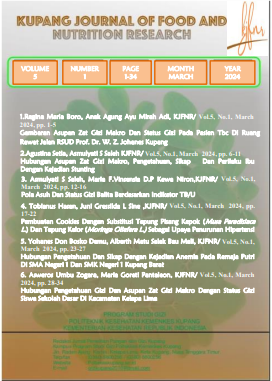THE RELATIONSHIP BETWEEN NUTRITIONAL KNOWLEDGE AND MACRONUTRIENT INTAKE WITH THE NUTRITIONAL STATUS OF ELEMENTARY SCHOOL STUDENTS
DOI:
https://doi.org/10.31965/kjfnr.v5i1.1474Keywords:
Macro Intake, Knowledge, Nutritional statusAbstract
Elementary school students are one of the vulnerable groups to nutritional and health problems. Nutritional status is the condition of the body which is the end result of the balance between nutrients that enter the body. Intake of macronutrients is the intake needed in relatively large amounts, including carbohydrates, fats, and protein. In addition to food intake, there are other factors that affect nutritional status, namely nutritional knowledge. Objectivethis research to determine the relationship between intake of macronutrients and nutritional knowledge with the nutritional status of school students in Kelapa Lima District. This research design uses a descriptive correlation with a cross sectional approach. Analysis of the data used is the fisher's exact test. From the results of the study, it was found that the frequency of nutritional status of students based on BMI according to age (BMI/U) in the undernutrition category was 6 people (2.3%), 18 people (6.8%) were overweight and 4 people were obese (1,5%). The carbohydrate intake of students in the more category was 6 people (2.3%) and the less category was 102 people (38.3). The protein intake of students was more than 47 people (17.7%) and less than 75 people (28.2%). The fat intake of students was more than 18 people (6.8%) and less as many as 95 people (35.7%). There were 79 (29.7%) students with enough nutritional knowledge and 52 students (19.5%) lacking knowledge. The results of the analysis stated that there was no relationship between carbohydrate intake, protein intake, fat intake and nutritional knowledge with nutritional status. Based on the results of the analysis, there is no relationship between carbohydrate intake, protein intake, fat intake and nutritional knowledge with nutritional status.








